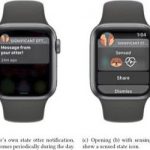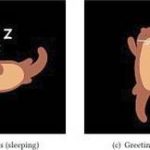Communication is key to a romantic relationship — and an app developed by a Carnegie Mellon alumna is helping couples to communicate better by using their heart rate and animated otters.
Fannie Liu is part of a team from Carnegie Mellon University, the University of Washington and Snap, which owns the popular social media platform Snapchat, that developed an app called Significant Otter, a play on the term “significant other” for a life partner. Significant Otter allows couples to use Apple Watches to communicate with one another using animated figures — otters, in this case — display emotions or activities based on a person’s heart rate.
The app uses a person’s heart rate — which can be monitored on an Apple Watch — to measure the user’s emotions. It uses that information to prompt the user to select an animated otter that matches how they’re feeling in that moment. Then, they send the otter to their significant other, who can respond with an animated otter of their own.
Liu said the team designed the app hoping it “could help couples connect with each other with biosignal data — more specifically, their heart rate.”
Biosignals, defined as signals in living beings that can be measured and monitored, include heart beats or muscle contractions and can be used to understand physiological responses.
New technology like smart watches allow people to monitor their heart rates — and that information can say a lot about how a person is feeling.
For example, if a person’s heart rate reveals high energy, that could correlate to emotions like excitement or anger, Liu said. It could also show that a person is engaging in physical activity.
The Significant Otter app uses a person’s heart rate to gauge what emotions they may be feeling at that moment. It then shows the user two animated otters expressing emotions that person may be feeling based on their heart rate — for example, if they have a high heart rate, they may be prompted to choose between an excited otter and an angry otter. The user can select the otter that best matches how they’re feeling and send it to their significant other.
“The otter might be animated according to different emotions or activities they could be engaged in,” Liu said.
Their significant other then receives a notification, showing them the otter that matches their loved one’s emotional state or activity. They can respond by sending back an otter that matches their current emotions based on their heart rate — or they can send an otter that isn’t tied to a biosignal, like one displaying a pat on the back to show support.
When people send texts and e-mails, she said, they’re often missing the body language cues that are conveyed in face-to-face interaction. Significant Otter helps people communicate on a deeper level than a standard text message, as its artificial intelligence gets its cues from a person’s biosignals. The user guides that technology by choosing which of two selected otters best matches their emotions or activities, sending the most accurate emotion to their partner.
While many couples use technology to communicate throughout the day — ranging from text messages to phone calls — the Significant Otter app offers a new way to facilitate more meaningful communication in just a few seconds, Liu said.
“We found that people felt it was an easier and more authentic way to communicate with their partner,” Liu said.
Sending an animated otter from a smart watch is quicker than pulling out a cellphone and composing a text message, she said.
And, because it’s drawing information from an individual’s heart rate, it’s also more authentic.
“People felt that by sharing their heart rate with each other, they’re being more open and honest with them,” Liu said.
People can’t control their heart rates the way they may control their facial expressions or body language. Therefore, the messages conveyed through heart rate are genuine, Liu said.
The technology was particularly beneficial for couples who were apart during the pandemic. In a study, some couples said the app made them feel more connected even when they were physically apart.
“One person said they felt like they were more physically there because it was coming from their partner’s body,” Liu said.
This can be a tool that helps people communicate better than other technologies even after the pandemic, she said.
“Even as people are able to gather together, people can still use this to stay connected when they’re apart,” she said. “People may not always be with each other, even post-pandemic. It’ll hopefully still be helpful.”
Even when a couple is together, Liu said, they can use Significant Otter to share biosignals, something a person may not be able to recognize otherwise.
“It’s a new way to express themselves or their feelings or how they’re doing,” she said. “Even when we’re together, we might not be able to recognize those things, or we might want to express those in a different way, coming from the heart.”













